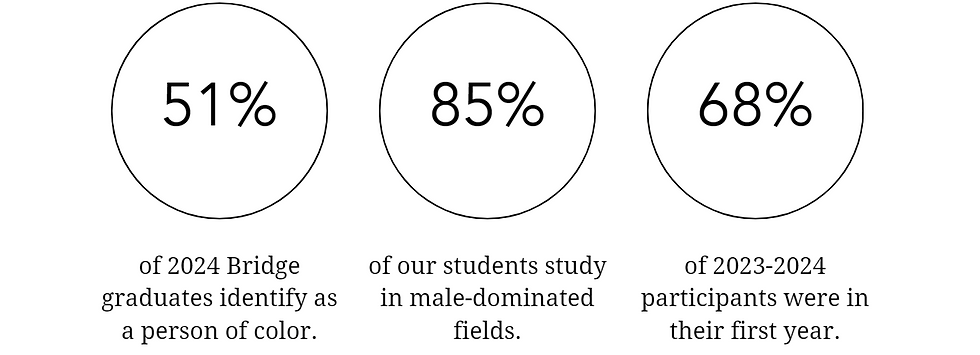Case Study: How EWAAB Helps Develop Women in STEM Into Young Professionals
- Giselle Espinoza
- Dec 13, 2023
- 4 min read
Updated: Aug 2, 2024
THE PROBLEM
Women in the United States make up 27% of the STEM workforce, yet they face countless hurdles to get there. From childhood, many girls confronted the idea of STEM being a male-dominated industry.
As they go through primary, secondary, and higher education, they face challenges related to gender-related bias, confidence, and a lack of mentorship. Students can feel less confident and lonely without a community and role models to lean on.
According to Microsoft research, interest in STEM fields doubles when girls have role models to look up to. This increases the number of women pursuing STEM careers and diversifies the workforce regarding gender.
Although women comprise half of those employed in STEM fields, three-quarters of those jobs are health-related. In contrast, one quarter or less are computing and engineering jobs.

So, how do we ensure undergraduate women are equipped with professional development tools and raise their confidence?

Meet Tanishka Kapoor, a Finance undergraduate from Stevens Institute of Technology in Hoboken, New Jersey. She is the first female in her family to attend college in the United States. When she was nine, she moved from India to the U.S. with her grandmother, mother, and brother.
Kapoor faced hurdles as she navigated the cultural differences and school system. She is a former EWAAB’s Bridge program mentee and will be Primary Mentor for her second year in the 2024-2025 school year.
KAPOOR'S BIGGEST PROBLEMS
1. Lack of understanding from others
Stevens has a 68:32 male-to-female ratio. As a minority in her classrooms, Kapoor faces challenges when speaking about her experiences, often feeling misunderstood.
2. Being competitive
Thousands of students are working towards a college degree. Considering the abundance of qualified individuals, it can be daunting to feel worthy of opportunities.
3. Finding community
The intersectionality of gender and ethnicity while being in a male-dominated environment can be isolating without an uplifting community.
SOLUTION
Today, organizations recognize that women need more resources to compete with their male counterparts. Building organizations and programs for women in STEM supports their desire to communicate with other women, share experiences, and feel empowered.
ABOUT EWAAB

At EWAAB, we are building a world where young women and non-binary folks can enter and rise in any field they choose. We achieve this through our core program, Bridge, a two-tiered mentorship scheme designed to build confidence and professional skills, and our Beyond program, a one-on-one mentorship scheme focused on individual career development exclusive to our Bridge alums.
In 2019, Kaitlin Gili and Dokminika Durovcikova, two physicists pursuing their undergraduate degrees, founded Encouraging Women Across All Borders. Their experiences of being the only women in their classrooms fueled their mission to ensure the women behind them could succeed in any field they chose. What started as a grassroots organization with only 27 students became a multinational nonprofit with nearly 300 students worldwide in 2023.
Today, there are students in the United States, United Kingdom, and Canada with Alumni in Australia and other European countries.
STUDENT DEMOGRAPHICS

HOW EWAAB SUPPORTS STUDENTS
1. We encourage them to unleash their confidence to succeed in any environment.
At the beginning and end of the Bridge program, mentees are given a survey in which they rank their confidence levels in various personal and professional areas.
We share stories so they know we’ve been there too. This way, they recognize mistakes and experiences as learning opportunities and can apply lessons to their own lives.
2. We recognize that the job market is increasingly competitive and prioritize teaching students valuable skills.
To ensure that students gain the proper experience to land their dream jobs, our team curated a 7-month curriculum so they can gain crucial skills every month and stand out in a pool of applicants.
We teach soft skills to complement the technical skills students learn in their STEM-related courses.
They are given monthly challenges to take action on what they learn and ask questions.
3. We help students find a community of women who are like-minded and driven.
As first- and second-year undergraduate students, mentees struggle to find their footing on a new campus while juggling their social, academic, and work lives.
Mentees are grouped with others from the same campus to build personal relationships and connect in person.
4. We offer opportunities for growth.
Students who complete the Bridge program are qualified to join the Beyond program, where they meet with a professional mentor.
Additionally, EWAAB students are eligible to apply for internships through our partners.
Third- or fourth-year undergraduate and graduate students can apply to become primary mentors and increase their leadership skills.
LOOKING FORWARD
Kapoor hopes to be a venture capitalist and an impact investor. In addition to her academic schedule, she is the President of Stevens Women in Business and involved with the Student Government Association of Stevens Institute of Technology (SGA) as well as writes for her school newspaper.
She is one of many students who study in a male-dominated field. Through our mentorship programs, leadership opportunities, and professional support, we aim to help her persist through higher education and successfully transition into her early career.
We hope to expand our impact beyond the 280+ students in the pipeline by prioritizing the professional development of undergraduate women and non-binary folks.
NOTES OF APPRECIATION
“Thank you to my parents for giving me these opportunities and support, especially to my dad for encouraging me and giving me the confidence to go into a male-dominated field.” - Tanishka Kapoor
We would like to thank every volunteer, donor, and supporter for following EWAAB’s journey. The work we do would not be possible without your help.




Comments